It’s hard to believe, but about five years ago I officially “broke-up” with processed foods. Yes, I had left General Mills two years earlier, but I consider the break-up official when I purchased my first summer share at a local, organic farm in 2010.
The break-up was a long time coming. After leading General Mills’ Honey Nut Cheerios (the cereal category’s #1 selling brand) and Hamburger Helper businesses, I had grown increasingly weary and wary of the processed food industry.
It’s A Systemic, Food Industry Problem
Let me be clear, though. This wasn’t a General Mills problem per se. It was and is, however, a food industry problem. I had worked at two other companies—Pillsbury and Nabisco. And while the brand names and categories may have been different, the approach was the same—create tantalizingly delicious products and market them in such a way that people would buy more and more.
Over the years as consumers demanded healthier foods, the über competitive food industry tried to keep pace with more and more unfounded, self-serving health claims. And with little to no boundaries set by the various government agencies that were supposed to be protecting consumers, food companies prevailed. The price we’ve paid, however, has been alarming—a dramatic decline in the overall health of our population.
What Made the Light Bulb Go Off for Me? Writing My Book, FAT PROFITS!
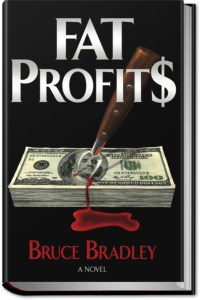 While I certainly had concerns during my time in the food industry, my “ah-ha” moment was triggered while I was writing my novel, FAT PROFIT$. You see, after leaving General Mills I pursued a personal passion of mine—writing. Following the proverbial advice to “write about what you know,” I decided a thriller about the food industry could make for an interesting story.
While I certainly had concerns during my time in the food industry, my “ah-ha” moment was triggered while I was writing my novel, FAT PROFIT$. You see, after leaving General Mills I pursued a personal passion of mine—writing. Following the proverbial advice to “write about what you know,” I decided a thriller about the food industry could make for an interesting story.
After a disastrous first draft that really didn’t take any definitive position on the processed food debate, I forced myself to step back and take an honest inventory. When you’ve been part of a particular culture for so long, it’s really hard to gain objectivity. But after finally breaking away and undergoing a systematic re-examination of the food industry I had worked for, I came to the following, fact-based conclusions:
Food Companies Aren’t Concerned With Your Health
I was a food marketer. I worked in the business for over 15 years. It’s hard to describe the amount of profit pressure that your average food marketing team is under. It’s constant and unrelenting.
Aggressive sales and profit goals are the norms, and failure is simply not an option. The end result is you become part of a culture where you unwittingly rationalize your actions.And so when you’re tasked with growing a cookie brand it’s very easy to say, “It’s just one cookie. Everybody deserves a cookie now and then.” While the rationale may be sound—”one cookie doesn’t really matter”—the sad reality is that every single consumer is bombarded daily with countless, misleading marketing messages for delicious, unhealthy processed foods.
And so when you’re tasked with growing a cookie brand it’s very easy to say, “It’s just one cookie. Everybody deserves a cookie now and then.” While the rationale may be sound—”one cookie doesn’t really matter”—the sad reality is that every single consumer is bombarded daily with countless, misleading marketing messages for delicious, unhealthy processed foods.
When you’re working in this world it’s very hard to see the forest for the trees. Each big food marketer is focused on a single tree—growing their brand and increasing profits. But if you take a step back and look at the broader forest, we’ve got a very deceptive processed food culture that’s constantly tempting consumers to indulge and eat or drink more.
Therefore, while most food marketers may not wish you harm—don’t be fooled. Your health is simply not their concern.
Processed Foods Aren’t Nutritious
Salt, processed sugars, refined grains, highly processed fats, and lots of industrial additives—that’s what in most processed foods. While it’s hard to blame any one particular food or beverage, if you take a step back and look at the overall impact of the highly processed “Standard American Diet” (SAD) the toll is alarming with dramatic increases in obesity rates, diabetes, and a whole host of other health issues.
Furthermore, as this SAD diet has migrated across the globe, the spread of highly preventative diseases has followed. This is an indisputable fact that the food industry refuses to even acknowledge.
SADly, we are most likely living during the first period in modern history where life expectancies will decrease—all because of our processed food culture.
Our Current Agricultural System Isn’t Sustainable
While we can have endless debates over the safety of GMOs and other food additives that have made their way into our diets, one simple fact is hard to ignore—our current agricultural system is not in sync with Mother Earth. Reliant on fossil fuels for fertilizer and ever-increasing amounts of highly toxic chemicals to kill weeds and control pests—this is the undisputed reality of our current “conventional” agricultural system.
How will Big Ag survive as fossil fuel reserves become scarce? How toxic will pesticides and herbicides need to become to maintain monoculture farming systems? I’m honestly not sure, but isn’t that the definition of unsustainable?
While organic agriculture systems certainly aren’t perfect, a 30-year study comparing organic and conventional farming concluded:
- Organic yields match conventional yields.
- Organic outperforms conventional in years of drought.
- Organic farming systems build rather than deplete soil organic matter, making it a more sustainable system.
- Organic farming uses 45% less energy and is more efficient
- Conventional systems produce 40% more greenhouse gases
- Organic farming systems are more profitable than conventional.
Sounds to me like we’re betting on the wrong horse if we’re expecting conventional agriculture to feed our ever-growing world with increasingly scarce resources.
Food Companies Treat Animals Inhumanely
The growth of Big Ag and huge, corporate farms has resulted in a “profit at all costs” mentality that harms animals. In his recently released book Pig Tales: An Omnivore’s Quest for Sustainable Meat, Barry Estabrook describes in excruciating detail how “in industrial agriculture, a sow is nothing more than a piglet machine.” And in a recent NPR interview he goes on to say that “80 percent of the sows in the U.S. live their lives in factory conditions where they are crammed into cages and fed an abundance of antibiotics to prevent disease.”
While such atrocities would be considered criminal acts if inflicted upon pets, these horrific practices have become acceptable with most large-scale farming operations. Not surprisingly, though, the true nature of industrial agriculture has been purposefully hidden from consumers and whitewashed behind pretty pictures of farm life that food companies use to make more profits by selling more cheap, inhumanely raised meat.
Finally, It Was Time to Quit Eating Processed Foods!
So yes, after over 15 years as a big food marketer, I made the decision to quit eating processed foods. I’ll be honest, making the switch to real food wasn’t easy. But when you understand why making a change is important, those feelings and beliefs rock you to your core and your likelihood of success skyrockets.
Over the next several months I’ll be sharing lots more stories about my real food journey. I’ll talk more about how I quit eating processed foods, where I “draw the line,” as well as summarize what I’ve learned in my My Top 10 Tips to quit eating processed foods. I’ll also share thoughts on how to discover your own food values—a very important step that can help cement your commitment to real food. Finally, I’ll also continue to share recipes, tips, and other resources to help make your real food journey a little bit easier!
How’s Your Real Food Journey Going?
Are you eating mostly real food now? How long ago did you quit eating processed foods? What helped you decide to make a change? Share your story in the comments below! And let us know how we can help you make the switch. After all, that’s our mission—helping folks on their real food journey so they can lead happier and healthier lives!
Cheers!
Bruce
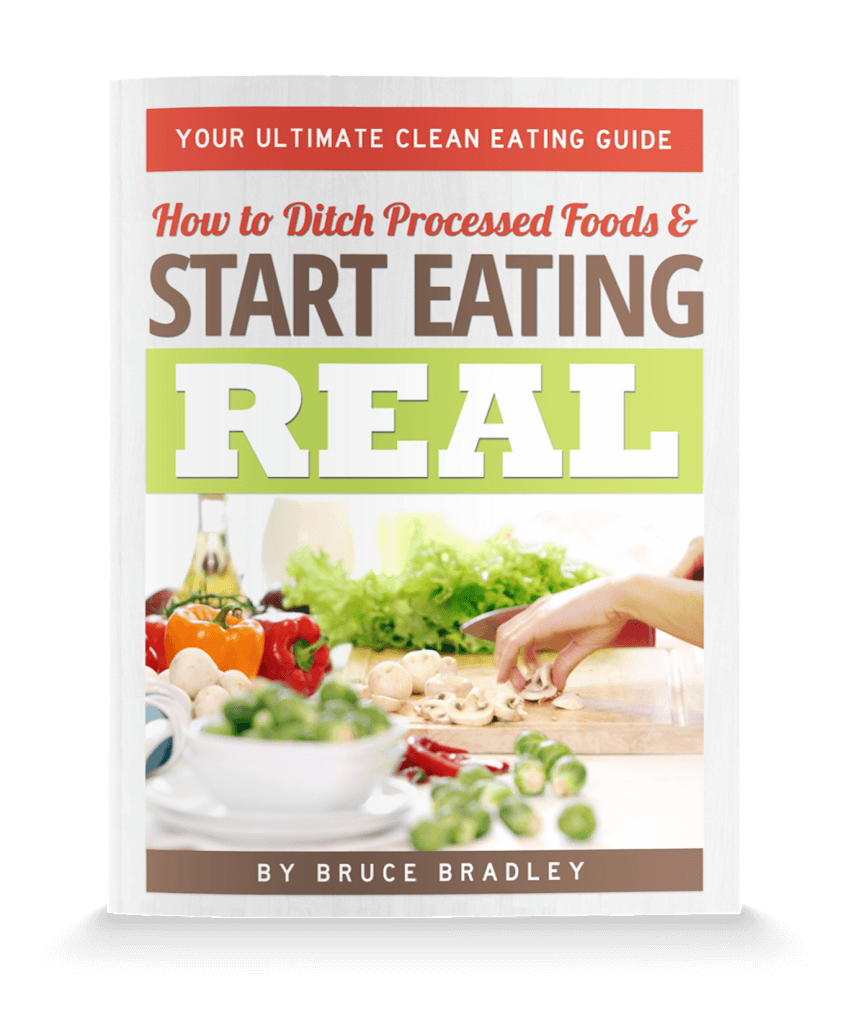
GET MY FREE BOOK NOW!
End the confusion! Learn what’s really in your food and how to take simple steps toward eating healthier!
EAT HEALTHIER TONIGHT!
If you enjoyed this article or recipe may I ask you a favor? Please share it with a friend. Why? Because together we can make a difference and help each other live happier and healthier lives. Thank you!
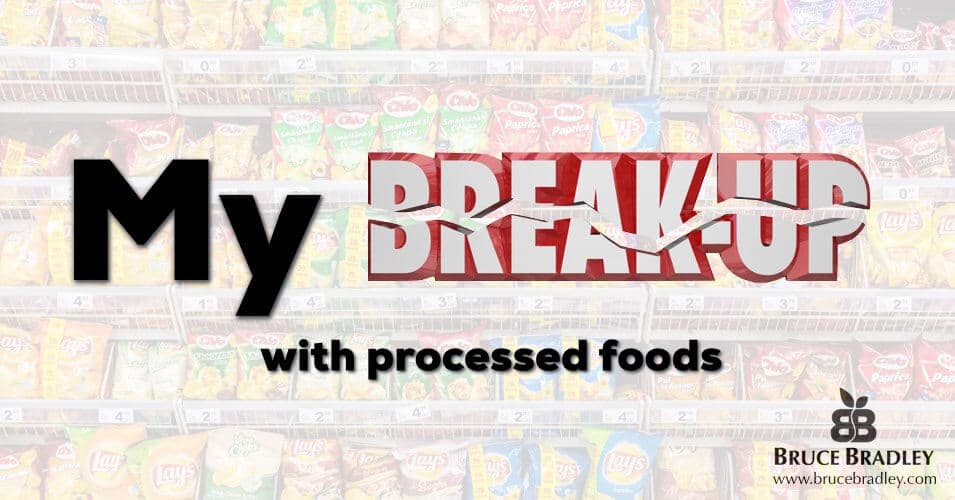
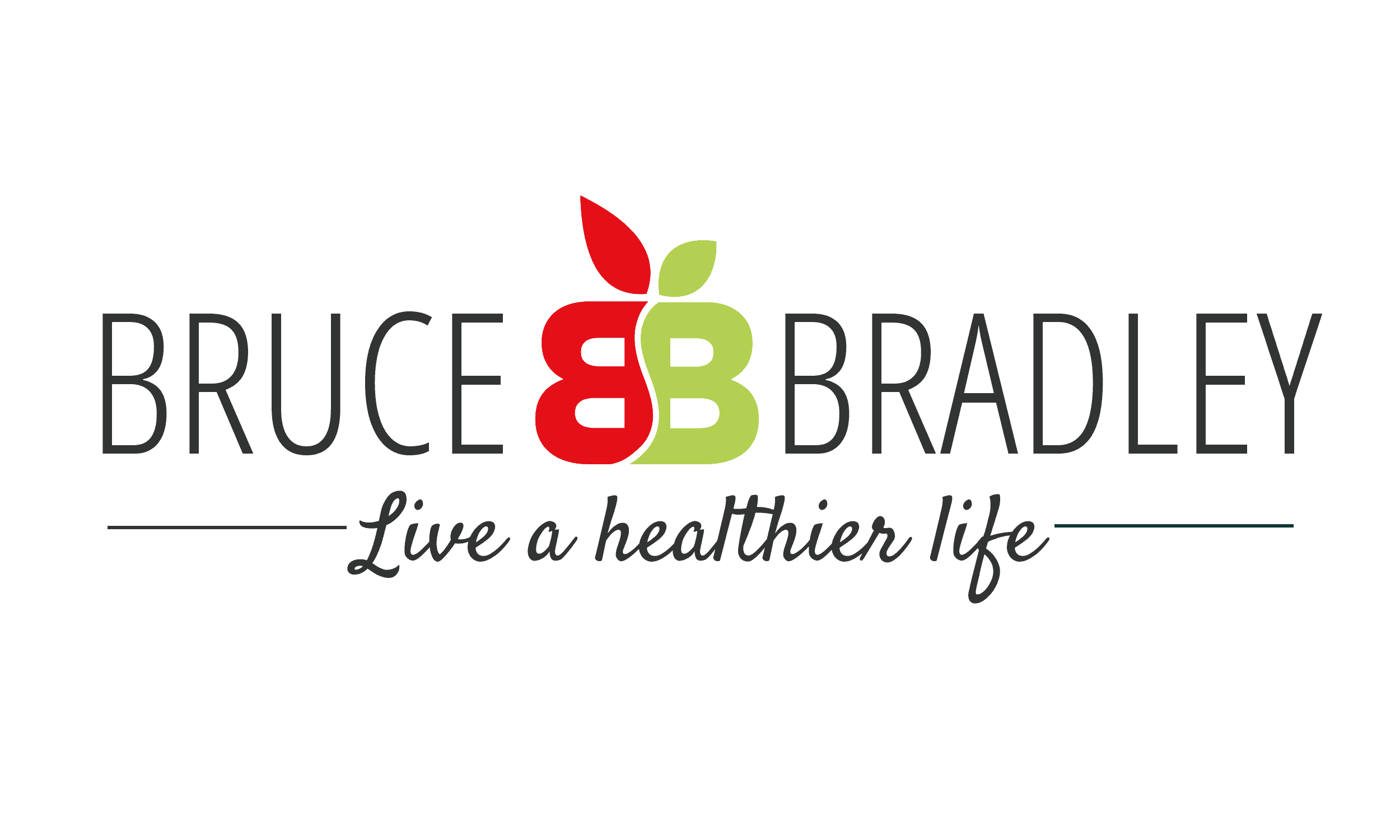

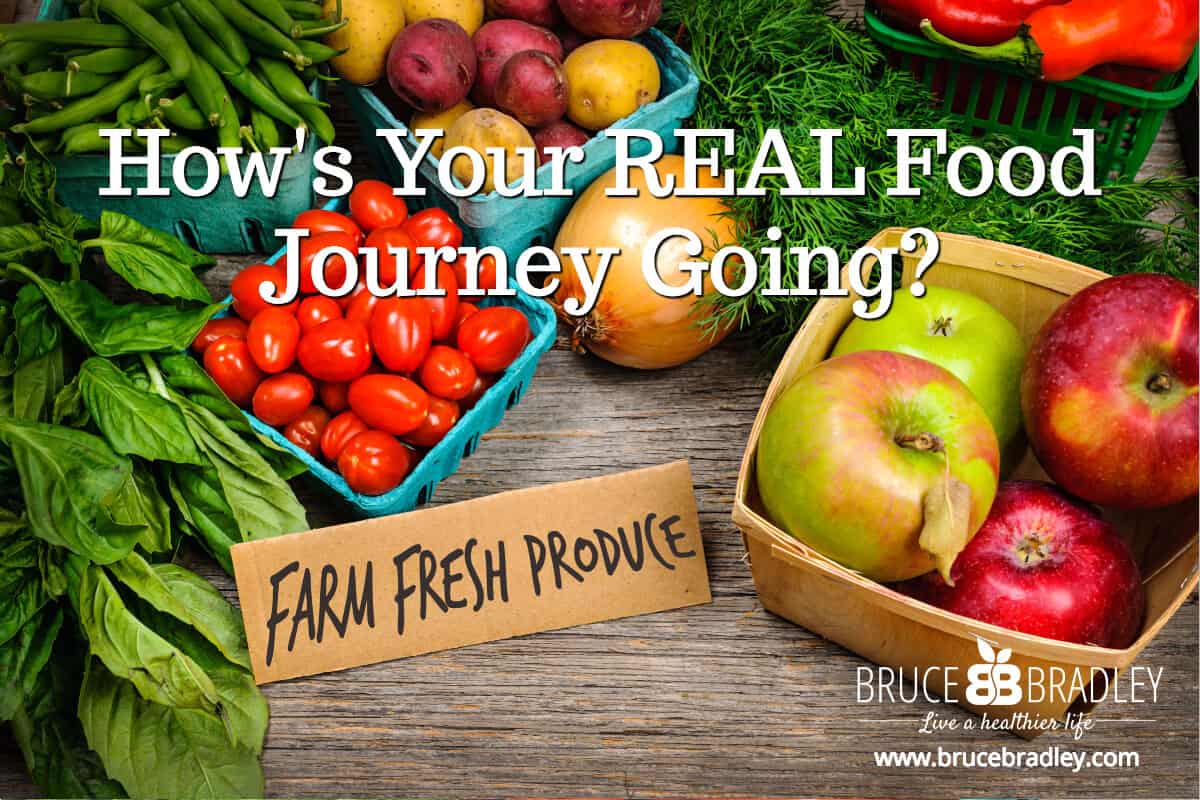

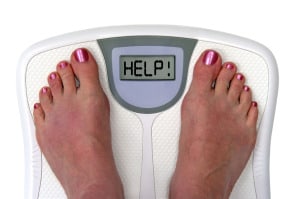

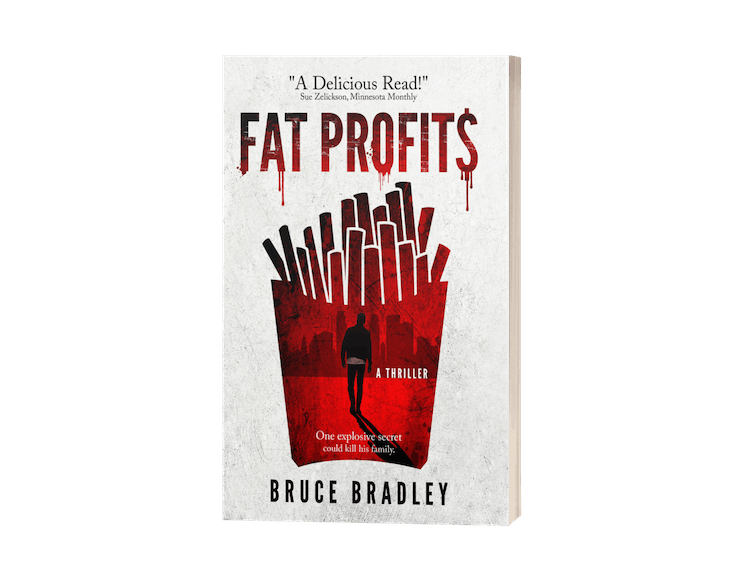
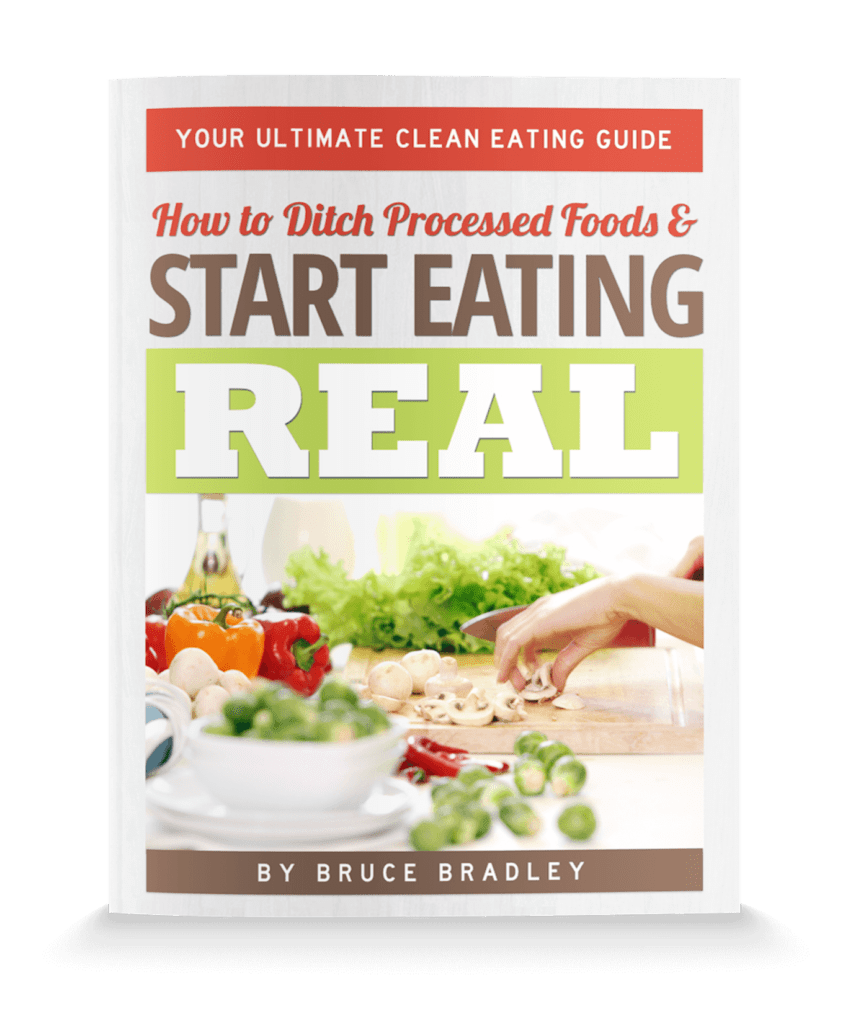
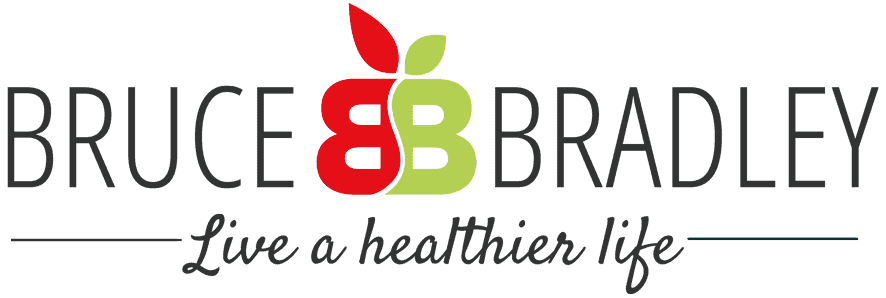
8 Responses
I read In Defense of Food by Michael Pollan in 2012 and that was what really got me to buying real food. I was interested in it previous to that, that’s why I read the book, but it seemed overwhelming. I wasn’t sure where to start and it all seemed so expensive. After reading the book I started making small changes in my grocery buggy (first change was buying organic milk) and now almost everything I eat is real food and if it’s processed (such as corn chips) I buy organic non-GMO versions. I feel so much better!
Thanks for sharing your story, Alicia … and sorry for my slow reply. I totally agree with you … small changes can make the totally overwhelming idea of making a break with processed foods MUCH easier!
Glad you’re feeling so much better! It’s amazing what real food can do for our bodies!
About 6 years ago I started going organic with vegetables and fruits. That progressed through the years into organic as much as possible. After finding I was gluten intolerant last year, I have become quite vigilant in what I purchase and eat. It has been of great benefit to me healthwise.
Changing how we eat truly is a journey and learning a whole new set of habits and routines. Glad it’s been such a positive change for you health-wise!
My family got off processed foods about 10 years ago. My husband and I were in our late 40’s. We were both overweight by 30 pounds. He was developing high blood pressure. Which is what had eventually killed his father. I decided to get rid of the junk and cook wholesome unprocessed food. We wanted to avoid high blood pressure medication if possible. The diet change lowered his blood pressure to a healthy level and we both lost weight. Now processed food tastes gross to us. We can really taste the chemicals, weird fats, and excess salt and sweeteners.
Seeing our health deteriorate is a huge motivating factor. Most of my family has struggled with weight issues, my mom’s a diabetic, and my dad had gastro-intestinal issues most of his adult life — all of the above thanks to processed foods. We are so much better off if we can cut the cord and eat clean. That said, I wish all processed foods tasted gross to me. While many of the do, some still call my name … I’ve just learned to rarely answer their call =)
I was fortunate to meet some very wise personal trainers and nutritionists that opened my eyes to eating real food. I came from a family that cooked most things from scratch so I had a good foundation, but there was lots of room for improvement. It has been 6 years and I keep fine tuning it so it is still a work in progress. I just wish we could trust the food companies, but we can’t. I hope the clean eating movement gains more momentum and we can get rid of all of the processed food. I vote with my dollars.
Thanks for your comment, Maggie. I think we’re all a work in progress so I congratulate you for all the progress you’ve made! And yes, let’s hope the clean eating movement can help create a much healthier world for us all to enjoy!